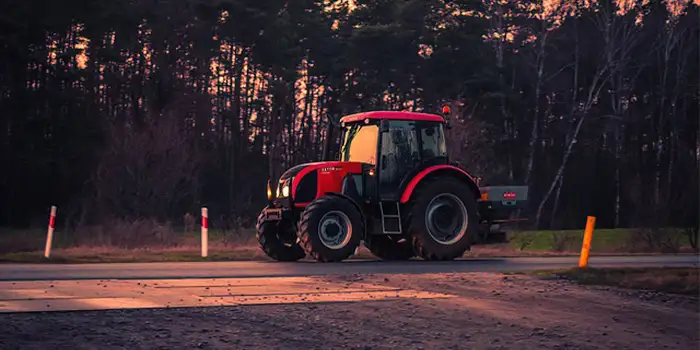I am fully aware of agriculture’s true significance in our society today, and I believe that by improving it through technological advancement is essential because it is about more than just providing food on our tables; it is also about nourishment in our bodies and a source of income for many farmers.
Agriculture and technology are strongly intertwined at every stage of the process. Technology has become a tool in some agricultural efforts and methods such as planting, collecting, and gathering. The use of technology in agriculture provides a less stressful and more cost-effective agricultural livelihood.
In this guide, you’ll learn:
- How technology improved agriculture
- Traditional Vs Modern Agriculture
- How farmers adapt to technological advancement
- Examples of technology used in agriculture
How technology improved agriculture
Agriculture has evolved dramatically during the last five decades. Consider how much technology has improved education and transportation; the same is true for agriculture.
There are several ways in which technology has helped agriculture, but let us focus on a handful that stands out.
1. Weather monitoring in farm production
Weather monitoring in farm production is one of the ways that technology has benefited agriculture; nevertheless, it is crucial to remember that there are nations in the western pacific Ocean, such as the Philippines and Japan, that experience a high number of typhoons each year.
Weather monitoring is a preventive measure and is a critical factor for a farmer’s success.
It can assist them in making numerous day-to-day decisions. These considerations include agricultural irrigation, fertilization schedules, and which days are best for field operations. Farmers’ decisions will determine whether their crop is lucrative or not.
2. Farmers’ work can be reduced by modern technology
Farmers’ work is hard, and they are exposed to sunlight, which makes it much more so. A farmer’s task is substantially simplified by modern technologies.
Agricultural machinery has advanced in recent years, with some of the most helpful improvements including tractor trailers, plows, seeders, and many more.
Some developing nations still use traditional farming practices.
However, combining modern technologies and traditional farming practices is feasible to regulate farmers’ efforts, boost worker safety, and minimize farmer time input by employing modern machinery.
In the future, I believe that farmers will have lesser time in exposing themselves on the field.
3. Better pricing promotion and marketing
Believe it or not, those working in agriculture, particularly farming, and livestock, are now somewhat educated in promotion and marketing.
Social media platforms are extremely beneficial to them since it allows them to market their products to the general public.
Though they still sell their crops or animals on a farmer’s market, most farmers use a combination of these two methods.
One excellent method of advertising and selling it online is to target supply stores and restaurants. They can readily speak with one another and close a transaction, which is the objective of any agricultural production.
4. Improved irrigation methods for crops
Irrigation is the application of the necessary amount of water to your plants to ensure optimal growth and development.
The traditional technique of agricultural irrigation required people to carry buckets of water from wells or rivers and sprinkle them on their crops; think how exhausting it is if you own a hectare of farming land and how long it would take you to complete.
Tubes, pumps, and sprays are modern irrigation technologies. Water is evenly sprayed on a farmer’s crops, increasing output while decreasing work burden.
Irrigation is highly important when rainfall is insufficient in some places since it may be utilized at any time, even when there is ample rain.
5. Higher crop productivity which leads to an increase in profits for farmers
Advances in agricultural technology have already demonstrated increased crop productivity and profitability.
Machine advancements have increased the speed and productivity of farm equipment, allowing for more efficient cultivation of more area. Seed, irrigation, and fertilizers have also significantly improved, allowing farmers to enhance harvests.
Farmers are delighted about the benefits that technological advancements have brought them.
Even with less physical labor and investment, they may still expect massive agricultural yields by the end of the year.
Producing everything from crops to animals with the help of technology can result in significant profits.
6. Transportation from farms to markets and cities throughout the world
Transportation is another example of how technology has enhanced agriculture. This is a less visible benefit because people only give credit to machines that help improve crop and livestock growth and health.
What’s the purpose of growing your crops or raising your livestock if you can’t deliver it to the market safely and securely.
Imagine if transportation wasn’t invented, crops would surely expire before they would reach the market or in our household.
There is no way to grow a firm without transportation, as everything must be delivered, shipped, or carried to the client.
Farmers’ produce must also be managed appropriately so that the quality of their items is not compromised.
Traditional Vs Modern Agriculture
There have been many improvements in the agricultural industry, but this does not apply to all countries.
Most nations continue to operate in the old manner owing to a lack of technical advancements, which is rooted in a lack of finance.
Countries that still practice traditional agriculture generate the majority of the world’s food that is served on our tables.
As we all know, traditional farming methods are labor-intensive and time-consuming.
Traditional agricultural practices have already established their worth in the agricultural industry, and farmers in developing nations are hesitant to modernize their ways since it may be safer to continue with what has worked for hundreds of years.
Some farmers considered that the traditional manner of farming was unfamiliar to them and had numerous negative consequences.
Organic farming is often thought to be more ecologically friendly than conventional farming.
I’ll share some pointers to help you understand the benefits and drawbacks of conventional farming.
Pros
- Traditional farming increases soil fertility, has less use of chemicals and pesticides, and has a maximum yield.
- The crops are healthier and more vibrant.
- They might command a greater price since they are pure.
- Water use is reduced as a result of the absence of chemical fertilizers.
- Milk, meat, and eggs are of higher quality in livestock farming.
Cons
- The traditional way is labor-intensive and takes a lot of time.
- Traditional farming depletes the land’s nutrition over time, resulting in undernourished and degraded soil.
- Traditional agriculture is not optimally set up, resulting in restricted irrigation.
- Poor yield and the limited variety of crop kinds.
- Only produce a small number of foods
On the other side, we have modern agriculture, which usually impresses us since most of us feel that if something is modern, we should follow it.
Modern agriculture today in some developed countries like the United States is building a modern greenhouse that is used for the production of fruits, vegetables, and any other plants that require special conditions.
They also have Indoor vertical farming that may boost crop yields, overcome restricted land area, and even lessen farming’s environmental effect by shortening the supply chain.
Modern agriculture aims to transform the agricultural industry into one that is vibrant, technologically sophisticated, and competitive. It must also be focused on human capital development.
Some modern agricultural technology has also shown its usefulness in the field, but not all; some newly developed technology requires much research and experience before it can be beneficial in the long run.
Let’s talk about the pros and cons of modern agriculture
Pros
- It can produce large amounts of food at affordable prices
- Equipment is reliable and user-friendly
- It takes less time and requires less work
- It can control climate conditions and plant’s nutrition
- It increases soil fertility.
Cons
- Machines are costly and it requires large amounts of capital to invest. Plus repairs can be costly.
- Chemical run-off has increased river contamination
- Crops aren’t that healthy and can cause health issues due to combinations of pesticides
- Micronutrients depletion in soil
- Farmers’ lack of knowledge, particularly when it comes to technology
Which one should you choose? Well, it’s quite difficult to have a direct answer since both of them have their benefits and drawbacks.
But, in my opinion, because we live in a technologically advanced era, we must recognize that each newly produced technology will have both positive and bad implications.
If we examine the positive and negative elements of how we produce food, we might be able to improve on the positive while reducing the negative.
Conventional farming allows for the production of significantly greater amounts of food on less land and with less physical effort than ever before in history.
There are billions of people on the planet, and traditional farming would not be able to provide all of our needs.
Even while traditional agriculture produces the vast majority of the world’s food, it is not entirely traditional; certain technology and equipment are still in use.
I believe that there should be a mix of traditional and modern agriculture because much research today still points to traditional agriculture as the best answer. They do, however, wish to acknowledge modern agriculture’s usefulness.
How farmers adapt to technological advancement
Farmers respond to technological innovation by incorporating it into their everyday agricultural practice.
Farmers are also given seminars and training to assist them to gain the essential expertise on how to utilize the devices.
Farmers in developed countries are continually encouraged to adapt to technological advancements, particularly if such improvements will benefit them in the long term.
People who work in agriculture have the option of adopting new technology; that is, they may modify certain parts of their work in the field to make it more personal or to make it more meaningful and less labor-intensive.
When examining the many technologies available, they must have an open mind. It sometimes relies on technology, the farmer’s location, and his or her demands.
The government has traditionally regarded farmers as passivity in terms of anticipating and adapting to new technologies, but the extent of their financial status does not enable them to be proactive agents of change.
Farmers are not required to embrace every new technology that enters the market; rather, only those that can help them grow more efficiently, faster, and at a lower cost must be adopted, since other farmers will do so and profit from the new technology.
Even though there are multiple challenges, they will not be competitive in the future if they continue to operate conventionally.
Sometimes, farmers adapt to technological development to tackle challenges that can only be handled by newly developed technology. These are the following:
- Increasing Food Demand
- Appropriate fertilizers for the crop and vaccines for the animals
- Structuring the farm into a proper business
- Improvement of product marketing and sales
- Help with pest control
They also adapt to technological improvements to lessen their hardships, as we all know, agricultural tasks are not simple.
They are aware of the issues they are experiencing, and the only way to address them is to invest in technology.
Examples of technology used in agriculture
There are lots of technology that is used in agriculture and some of them are already present for hundreds of years.
Nowadays, several types of machinery and technology are employed in various agricultural tasks.
These are some of the most useful technologies that are present in agriculture today:
- Tractor: A vehicle with huge rear wheels or that travels on rails and is used to haul farm tools. They are the most flexible pieces of farming equipment and serve as the farm’s workhorse.
- Plough: Ploughing is the process of breaking, loosening, and rotating soil to remove weeds and aerate the soil. This is also used to prepare the ground for planting.
- Weather tracking: Computerized weather tracking are very useful because its services are mainly focused on agriculture and farmers. This device can alert farmers in advance of weather occurrences that might harm their crops or animals.
- Food Processing and Storage: Farmers do not have the option of keeping their produce safely throughout the post-harvest season. But with the help of food processing and storage, this can improve the product’s durability and storage.
- Sprayer: This device is used to spray insecticides, pesticides, and fertilizers, as the name implies. It can be liquid or powdered, which has aided farmers in crop protection.
- Seed Drill: This equipment assists farmers in seeding in a continuous flow, regulated depth, and consistent pace. This also guarantees that the seed is uniformly spread throughout the soil.
There are numerous useful technologies in agriculture nowadays, and their sole purpose is to make farmers’ labor easier.
Because agriculture is such a vital industry for mankind because it generates our food, professionals will continue to develop in the future to create new possibilities and protect our planet from environmental risks.
Final Thoughts
Although we have a lot to improve on our technology for agriculture, the path that we are on today is incredibly exciting already.
We’re harnessing the power of innovation to make farming more smarter and sustainable to feed a growing world.
Technology in agriculture is not just about fancy gadgets; it’s about ensuring our fields yields more and our planet is treated kindly.










